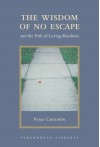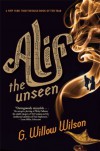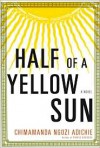Currently reading
The Wisdom of No Escape: And the Path of Loving-Kindness
River of Smoke: A Novel
Alif the Unseen
Half of a Yellow Sun
Taoist Qigong for Health and Vitality: A Complete Program of Movement, Meditation, and Healing Sounds
Sea of Poppies
AyurVeda: The Science of Self-Healing
Medicine Buddha Teachings
Tibetan Book of Living and Dying: The Spiritual Classic and International Bestseller
The Fault in Our Stars
Among Others
 What a fantastic love letter this is to those who grew up loving books far more than the people who populated the tiny ripples of their shallow aged pond. Walton surely shows her knowledge of the subject, but she also warmingly shows that the world and the people in it have quite the capacity to get better as one gets older and those ripples grow and one's pond seems bigger.Walton also deftly shows how well read in SF/fantasy books of the era, which could easily have felt like name dropping, but the way she writes Mori/Mor it comes off far more that this is the way she relates to the world. And it seems Walton does or at least did. She easily weaves words, phrases, and dialogue from these books that seem far more real than the world Mori/Mor lives in. And this does not seem trite or cheating, but makes her seem far more genuine.I also have to presume Walton uses a stick/cane, or did in the past, as she captures the essence of life with a 3rd leg so well. In fact, I found myself highlighting pieces of her text every time she discusses it because it is so spot-on. I will make no hesitation quoting her in the future along these lines because she makes the case so perfectly, without ever seeming to put effort into it - which I am sure is the exact opposite the case, but I still marvel at her exacting prose here.I would be far more impressed with her writing if I found out she never needed to use a stick. As someone who does, and can not get around for more than 4 or 5 steps without one, this is amazingly impressive writing going on.As for the story, it is written in diary entry form. This nearly put me off from reading it, as I find this to be far overused literary device, and far too often not used well. But I am not sure Mori/Mor's story could be told without at least some journal entries, as this is really about her learning how she actually shimmers in the real world the same colors and hues that she finds so enjoyable in her books.The real challenge within the text is filtering out what is real, what is story, and what is simply metaphor. It is a story about magic, but is this magic true or her coping mechanism? And at the end of the day, how much does this matter. Walton quotes Vonnegut, or at least uses a few of his words/phrases and this leads one to wonder just how much Billy Pilgrim is in Mori/Mor and how much Slaughterhouse-Five is in Among Others. But one thing Walton does is leave Vonnegut's corrosive "so it goes" cynicism out of this book. At first I was unsure why, but then realized as much as an obvious literary crush she has on him, this is a book about coming of age in hope and seeing Vonnegut's positive elements (ie. Karass) as points of focus.And when that hit me, this book really came together as far more than the story of a lonely book lover finding her karass and finally feeling as if she fit in the world to being a call to others to seek out that which they find their magic in, to embrace it, to plant roots in it, to see beyond the reality that seems overly harsh and unaccepting and rise like a hope filled phoenix to rewrite how life seems to how you want to live.And for as often as this is a sad book, this message resonates and overtakes it and like magic makes into something new.This is also a book about what makes a family. Perhaps that was evident in Walton using Vonnegut's karass, but outside the hope that resonates as each of her ripples in the water get larger this is about the realization of who you are, where you come from and where you are going can be as tied together, weaved like platted hair, as strongly or loosely as one wishes. Family clearly has a biological/genetic definition, but Walton uses Mori/Mor to show that relations do not have to be familiar and/or familiar to be family. And while it may not exactly be an accurate comparison I could not escape thinking about I Kill Giants as I read this. Both are stories about one dealing with an absent/missing mother, but from very different fondness. And anything that gets me thinking about I Kill Giants is perfectly alright with me. It is quite interesting that they nearly tell the inverse of each other's story, but with much the fulcrum of their story's dependent on a mother and the world they populate to deal with issues each mother's bring.Highly recommended.
What a fantastic love letter this is to those who grew up loving books far more than the people who populated the tiny ripples of their shallow aged pond. Walton surely shows her knowledge of the subject, but she also warmingly shows that the world and the people in it have quite the capacity to get better as one gets older and those ripples grow and one's pond seems bigger.Walton also deftly shows how well read in SF/fantasy books of the era, which could easily have felt like name dropping, but the way she writes Mori/Mor it comes off far more that this is the way she relates to the world. And it seems Walton does or at least did. She easily weaves words, phrases, and dialogue from these books that seem far more real than the world Mori/Mor lives in. And this does not seem trite or cheating, but makes her seem far more genuine.I also have to presume Walton uses a stick/cane, or did in the past, as she captures the essence of life with a 3rd leg so well. In fact, I found myself highlighting pieces of her text every time she discusses it because it is so spot-on. I will make no hesitation quoting her in the future along these lines because she makes the case so perfectly, without ever seeming to put effort into it - which I am sure is the exact opposite the case, but I still marvel at her exacting prose here.I would be far more impressed with her writing if I found out she never needed to use a stick. As someone who does, and can not get around for more than 4 or 5 steps without one, this is amazingly impressive writing going on.As for the story, it is written in diary entry form. This nearly put me off from reading it, as I find this to be far overused literary device, and far too often not used well. But I am not sure Mori/Mor's story could be told without at least some journal entries, as this is really about her learning how she actually shimmers in the real world the same colors and hues that she finds so enjoyable in her books.The real challenge within the text is filtering out what is real, what is story, and what is simply metaphor. It is a story about magic, but is this magic true or her coping mechanism? And at the end of the day, how much does this matter. Walton quotes Vonnegut, or at least uses a few of his words/phrases and this leads one to wonder just how much Billy Pilgrim is in Mori/Mor and how much Slaughterhouse-Five is in Among Others. But one thing Walton does is leave Vonnegut's corrosive "so it goes" cynicism out of this book. At first I was unsure why, but then realized as much as an obvious literary crush she has on him, this is a book about coming of age in hope and seeing Vonnegut's positive elements (ie. Karass) as points of focus.And when that hit me, this book really came together as far more than the story of a lonely book lover finding her karass and finally feeling as if she fit in the world to being a call to others to seek out that which they find their magic in, to embrace it, to plant roots in it, to see beyond the reality that seems overly harsh and unaccepting and rise like a hope filled phoenix to rewrite how life seems to how you want to live.And for as often as this is a sad book, this message resonates and overtakes it and like magic makes into something new.This is also a book about what makes a family. Perhaps that was evident in Walton using Vonnegut's karass, but outside the hope that resonates as each of her ripples in the water get larger this is about the realization of who you are, where you come from and where you are going can be as tied together, weaved like platted hair, as strongly or loosely as one wishes. Family clearly has a biological/genetic definition, but Walton uses Mori/Mor to show that relations do not have to be familiar and/or familiar to be family. And while it may not exactly be an accurate comparison I could not escape thinking about I Kill Giants as I read this. Both are stories about one dealing with an absent/missing mother, but from very different fondness. And anything that gets me thinking about I Kill Giants is perfectly alright with me. It is quite interesting that they nearly tell the inverse of each other's story, but with much the fulcrum of their story's dependent on a mother and the world they populate to deal with issues each mother's bring.Highly recommended.












